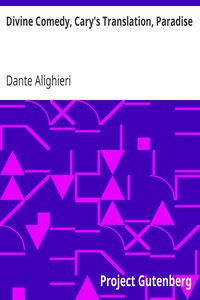Divine Comedy, Cary's Translation, Paradise by Dante Alighieri
"Paradise" by Dante Alighieri (translated by the Rev. H. F. Cary) is a poetic narrative and the third part of the epic poem "Divine Comedy," written during the early 14th century. The work explores themes of divine love and enlightenment as the protagonist, Dante, journeys through the celestial realms of Heaven. Accompanied by Beatrice, a symbol of divine wisdom, Dante seeks to comprehend the nature of God and the divine order of
the universe. The opening of "Paradise" sets the stage for this celestial journey. Dante begins by invoking the Muse Apollo and expresses his desire to recount the divine experiences that surpass human understanding. He describes encountering bright souls within the heavens, revealing deep truths about divine justice, free will, and the harmonious order of creation. The dialogue between Dante and Beatrice reveals her guiding wisdom, as she instructs him on the nature of souls and the divine intention governing the universe. This introduction hints at the complexities of love, wisdom, and the transformative power of faith that will unfold throughout the narrative. (This is an automatically generated summary.)
Read or download for free
| How to read | Url | Size | |||
|---|---|---|---|---|---|
| Read now! | https://www.gutenberg.org/ebooks/1007.html.images | 252 kB | |||
| EPUB3 (E-readers incl. Send-to-Kindle) | https://www.gutenberg.org/ebooks/1007.epub3.images | 208 kB | |||
| EPUB (older E-readers) | https://www.gutenberg.org/ebooks/1007.epub.images | 209 kB | |||
| EPUB (no images, older E-readers) | https://www.gutenberg.org/ebooks/1007.epub.noimages | 191 kB | |||
| Kindle | https://www.gutenberg.org/ebooks/1007.kf8.images | 388 kB | |||
| older Kindles | https://www.gutenberg.org/ebooks/1007.kindle.images | 348 kB | |||
| Plain Text UTF-8 | https://www.gutenberg.org/ebooks/1007.txt.utf-8 | 223 kB | |||
| Download HTML (zip) | https://www.gutenberg.org/cache/epub/1007/pg1007-h.zip | 172 kB | |||
| There may be more files related to this item. | |||||
Similar Books
About this eBook
| Author | Dante Alighieri, 1265-1321 |
|---|---|
| Translator | Cary, Henry Francis, 1772-1844 |
| Title | Divine Comedy, Cary's Translation, Paradise |
| Note | Wikipedia page about this book: https://en.wikipedia.org/wiki/Paradiso_(Dante) |
| Credits | Judith Smith and Natalie Salter |
| Reading Level | Reading ease score: 67.0 (8th & 9th grade). Neither easy nor difficult to read. |
| Language | English |
| LoC Class | PQ: Language and Literatures: Romance literatures: French, Italian, Spanish, Portuguese |
| Subject | Epic poetry, Italian -- Translations into English |
| Subject | Italian poetry -- To 1400 -- Translations into English |
| Category | Text |
| EBook-No. | 1007 |
| Release Date | Aug 2, 2004 |
| Most Recently Updated | Jul 4, 2022 |
| Copyright Status | Public domain in the USA. |
| Downloads | 266 downloads in the last 30 days. |
| Project Gutenberg eBooks are always free! | |

